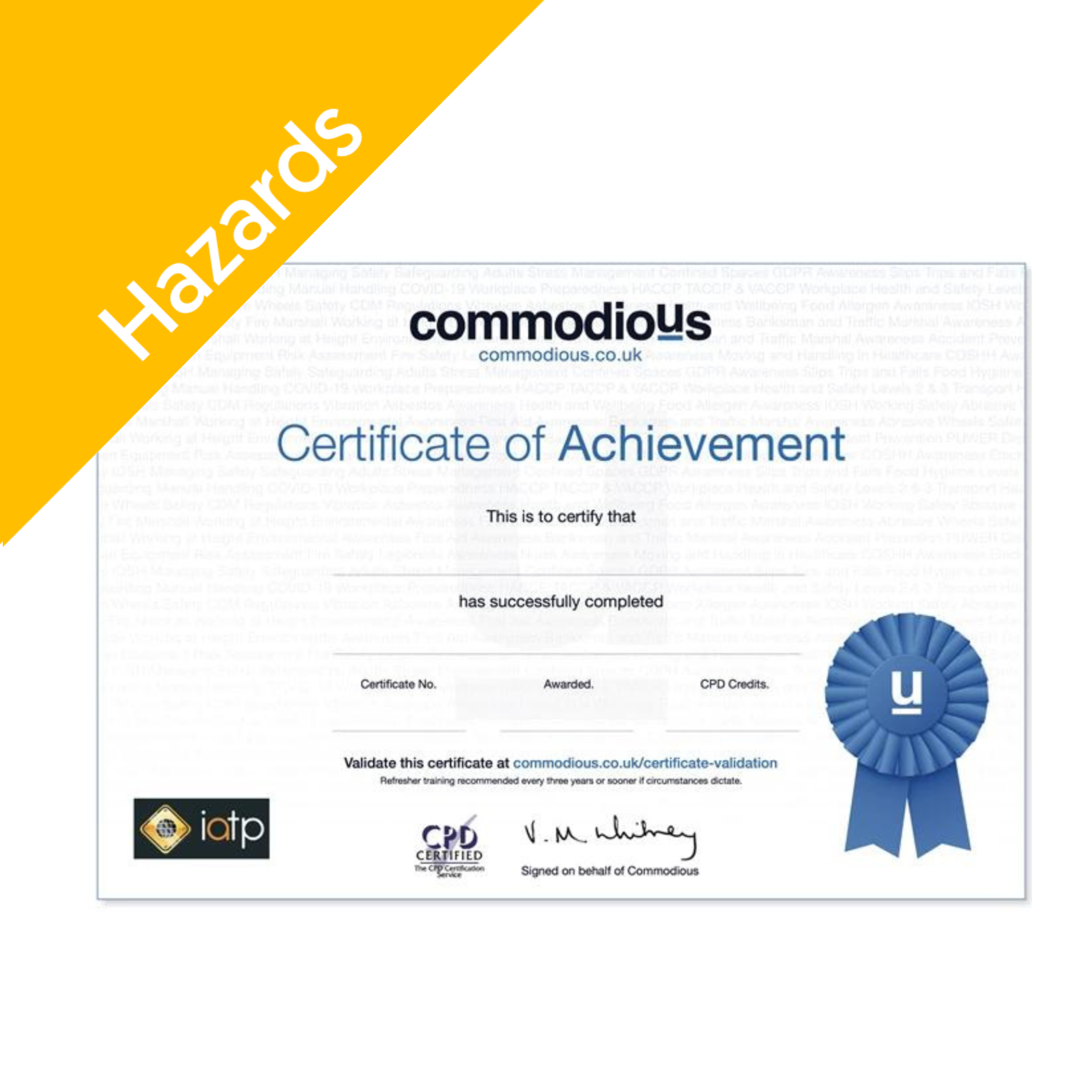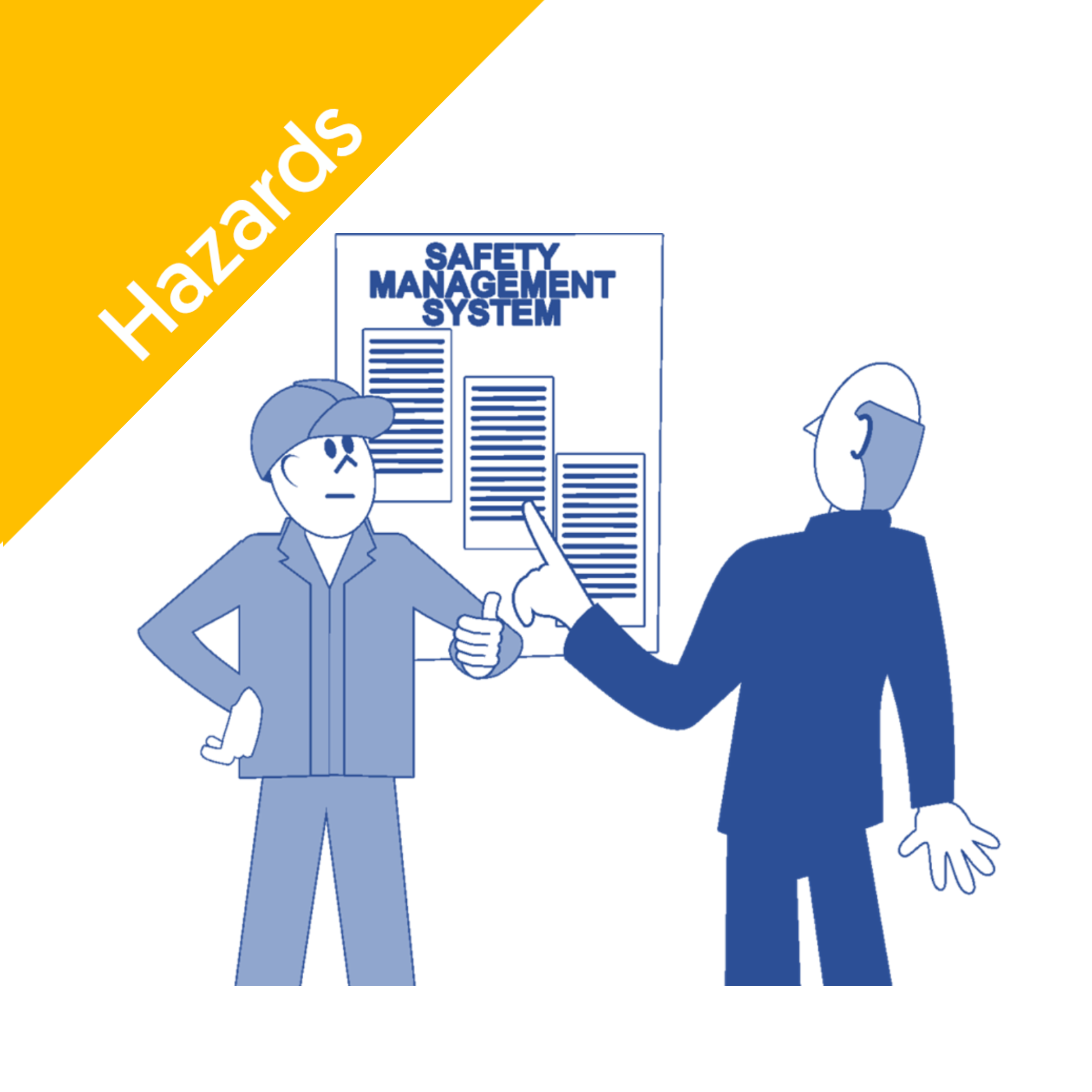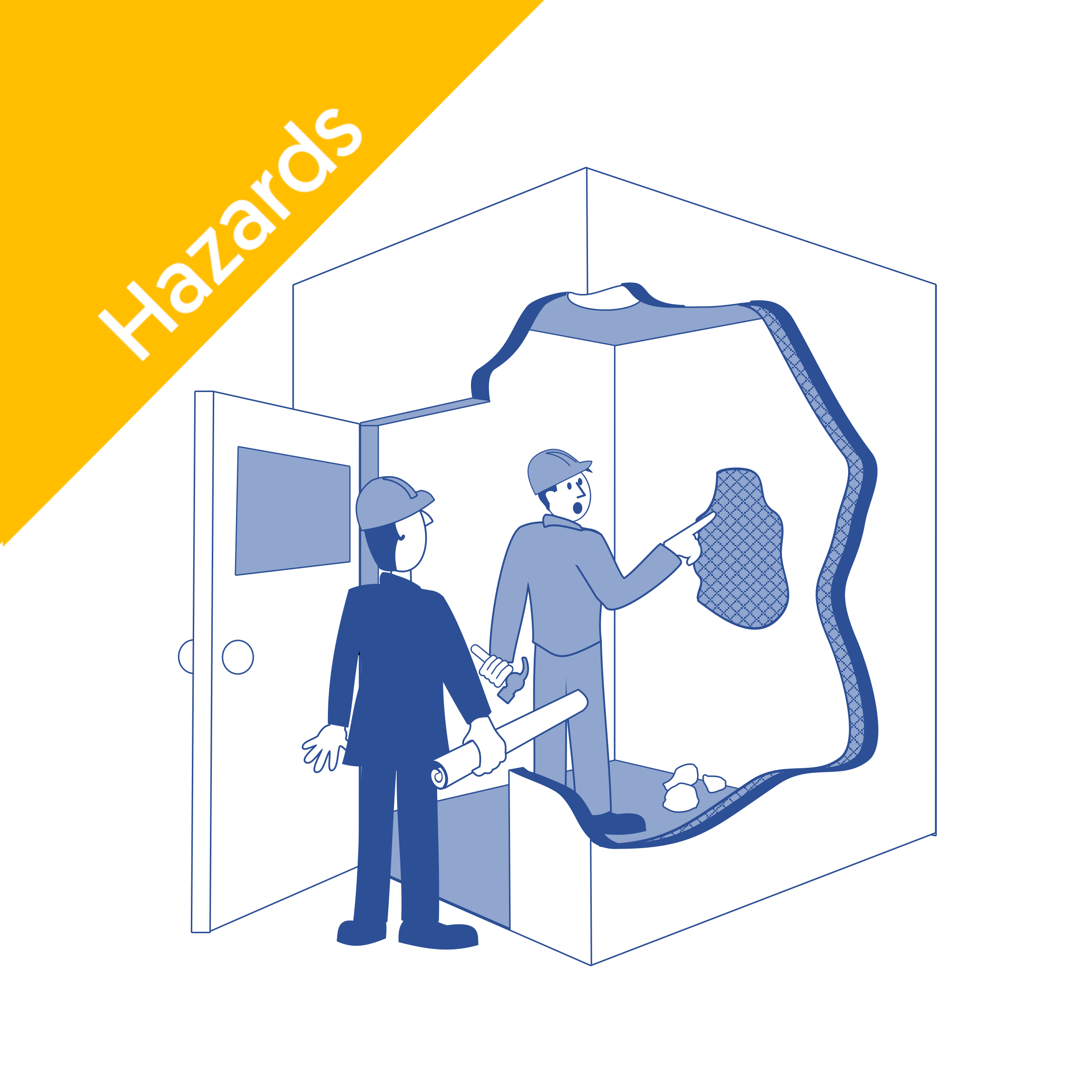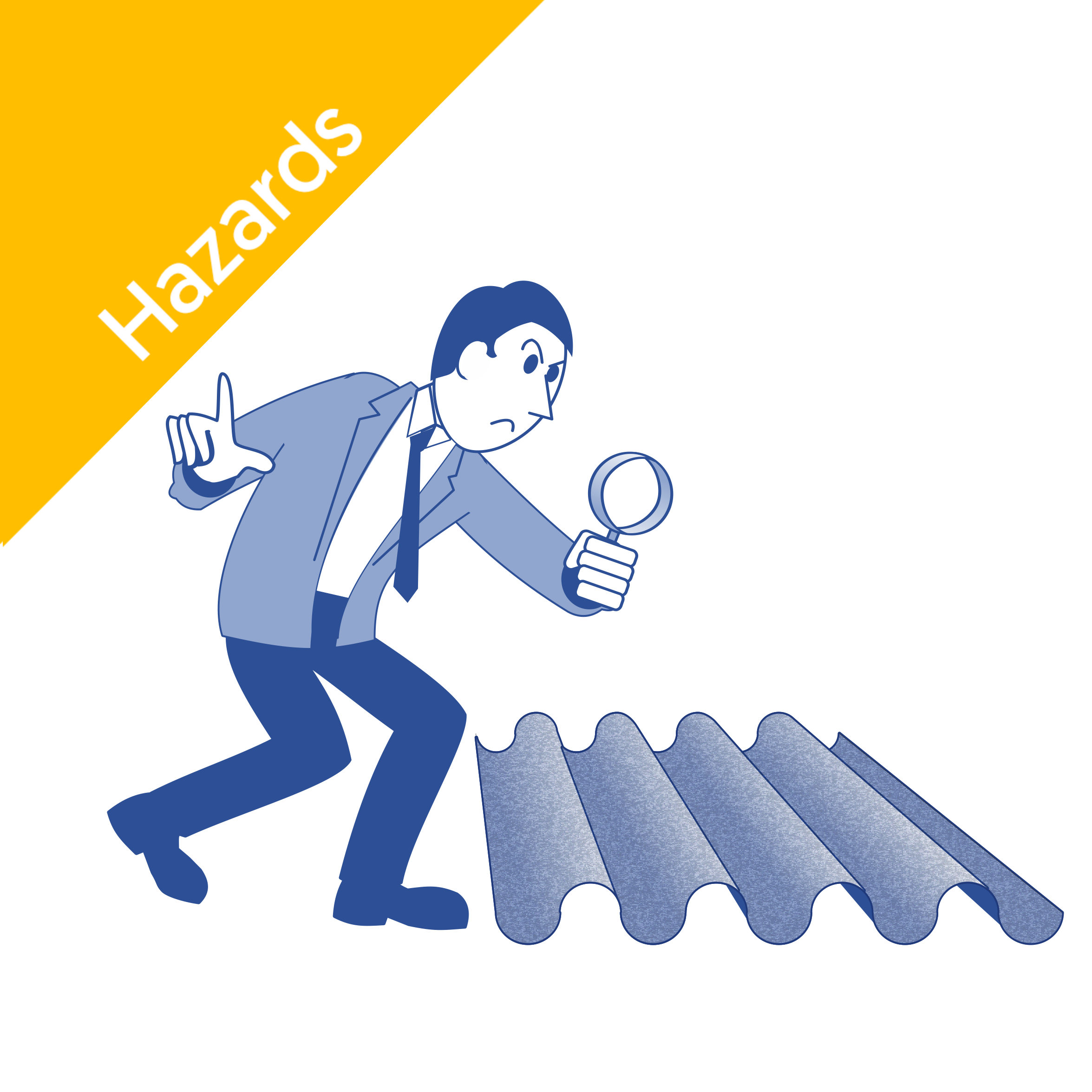It can be difficult to identify asbestos, as it is often mixed with other materials. The HSE's asbestos image gallery shows several common materials that contain asbestos. The two screenshot images below are from our course. The information buttons show familiar places where asbestos-containing materials are found in domestic and industrial premises and may help you answer the question.
How Do You Detect Asbestos?
If you suspect an asbestos-containing material (ACM), how do you detect and test them?
If you are concerned that the building you are working in might contain asbestos, you should take the following steps:
- Consider the age of the building. If it was built after 2000 it will not contain asbestos. Properties built before 2000, however, may contain asbestos-containing products.
- If you are working on non-domestic premises or the common areas of domestic premises, you should request to see the asbestos register. It is a legal requirement for the duty holder (responsible individual or team) to hold an up-to-date list of all known asbestos-containing materials on premises, such as the one here.
- Request the duty holder inspect the asbestos-containing material (ACM) for damage. Asbestos materials are not deemed dangerous by the Health and Safety Executive (HSE) unless their fibres are emitted due to damage or disruption. As a result, you should inspect ACMs regularly, checking for physical damage such as abrasions, tears, and water damage.
The most comprehensive way to check for ACMs in to arrange for an asbestos survey to be carried out; this is an effective way to help you manage asbestos by providing accurate information about the location, amount, and type of asbestos-containing materials (ACMs).
You need to find out if you are responsible for maintenance and are the duty holder for the asbestos. The person responsible for maintenance of non-domestic premises must either arrange a survey if it is suspected there could be ACMs in your premises, or the duty-holder may instead choose to presume the worst case of widespread asbestos in the premises and would then need to take all appropriate precautions for any work that takes place. However, it is often less troublesome and more proportionate to have an asbestos survey carried out. A survey will help it become apparent whether asbestos is present and its condition.
What is an asbestos survey?
An asbestos survey is performed by a professional who will first gather information about your home, such as the year it was built and whether it has had renovations or repairs that may have disturbed any asbestos. The basic purpose of an asbestos survey is to identify ACM and record what it is, where it is and in what quantities. Other information like the accessibility and condition of the ACM and the type of asbestos will also be recorded.
The HSE recognises two types of ACM survey. A management survey and a refurbishment/demolition survey.
Asbestos Management Survey
The goal of the Management Survey is to control ACM throughout normal occupancy and use of the property.
A Management Survey seeks to ensure that nobody is affected by the continued presence of ACM in the premises, the ACM remains in good condition, and no one mistakenly disrupts it.
The Survey must identify ACMs that could be damaged or disrupted by usual activities or general maintenance. Following the survey, a report will be issued outlining any remedial work required.
Asbestos Refurbishment or Demolition Survey
The Refurbishment / Demolition Survey is necessary when the premises, or a portion of it, needs to be upgraded, renovated, or demolished. The survey will not need to record the condition of the ACM.
A Refurbishment / Demolition survey’s purpose is to safeguard from harm due to works involving ACM in the premises and set out a correct way for a contractor to carry out work.
Before any structural work at the property begins, the Survey must find all asbestos-containing materials.
Following a survey, the surveyor should produce a report detailing the findings. This information can help you prepare an asbestos risk register.
You should only use asbestos analysts who have been UKAS registered; the list is available here.
What is the Risk if I Find Asbestos at Work?
The presence of asbestos should not be a reason for alarm. Asbestos only becomes a health issue when it is discharged into the air and inhaled.
Duty holders, or those responsible for maintaining or repairing non-domestic premises, must actively manage any asbestos in buildings. This approach gives a practical method for identifying, prioritising, and appropriately planning the actions required to mitigate the risks.
Asbestos-containing materials should be left in situ and monitored if they are in good condition and are not in a position where they are likely to be disturbed.
However, if the asbestos is in poor condition or is likely to be damaged during typical building usage, it should be sealed, contained, or removed.
Individuals most in danger of asbestos fibre exposure are tradespeople and maintenance employees who routinely disrupt the fabric of buildings during their job. Such individuals must take precautions to avoid endangering themselves or others by disturbing asbestos.
What Should I Do if I Discover Asbestos at Work?
Asbestos has the potential to incur fatal harm and is still prevalent in many buildings. Identifying it and dealing with it safely is crucial.
If you come across an asbestos-containing item, you should immediately stop what you're doing, avoid handling or disturbing it, seal off the area, and display warning signs indicating that asbestos is present.
Confirm or assume it is asbestos and conduct a risk assessment. This step will help evaluate whether the work requires a licenced contractor. For a list of licensable and non-licensed work visit: https://www.hse.gov.uk/asbestos/licensing/licensed-contractor.htm
If the risk assessment shows that remedial works do not require a license, you should only proceed if you have received the necessary information, instruction, and training.
Remember that every attempt to repair or remove asbestos raises the risk of potentially lethal fibre exposure.
What Should I do if I have been exposed to Asbestos Accidentally?
People who believe they have been exposed to asbestos are understandably concerned about the health consequences.
Although the type of asbestos used and the time of exposure may be known, there may be little credible information available on the level of exposure. These are all key criteria in establishing the level of risk: the more fibres generated by an asbestos-containing substance and the longer the job activity lasts, the larger the cumulative exposure to asbestos fibres and, consequently, an increased risk of adverse health effects.
Some work activities are more likely to generate a considerable concentration of asbestos fibres in the air and thus increase the risk if appropriate precautions are not taken. For example,
- using power tools on asbestos-containing materials
- any work that leads to physical disturbance of asbestos-containing materials that a licenced contractor should handle; like sprayed coating, lagging, asbestos insulating board (AIB)
- physical disturbance of asbestos cement, such as breaking or shattering.
Short-term, unintentional asbestos exposure with low fibre exposure has little probability of creating long-term harmful health effects.
How do You Remove Asbestos?
If the asbestos-containing material is in bad condition, an asbestos specialist may recommend that you arrange for its removal. In this instance, you must seek the services of an accredited asbestos contractor.
All asbestos removal operations must be done following the Control of Asbestos Regulation (2012). It should only be done by a licenced contractor who must produce a detailed documented plan of the removal process. Contact the Health and Safety Executive or the Asbestos Removal Contractors Association for a list of contractors with the necessary certification.
To avoid contaminating furniture, clothes, and other items, the area around the asbestos must be cleared before asbestos treatment can begin. Polythene sheeting must cover any walls or items that cannot be removed. When in contact with the affected area, all employees must use a class H Vacuum and always wear protective clothes and respirators. The contractor shall produce a written report explaining the procedures followed at the end of the work.
After the job is complete, you should call a specialist who can undertake air testing to check that all asbestos has been removed and to determine whether the clean-up and removal were done correctly.
If you want to understand more about asbestos removal, check out our summary of HSE guidance HSG248 Asbestos: The Analysts' Guide Revised
How is Asbestos Disposed of?
Only a professional contractor should remove higher-risk asbestos-containing materials like sprayed asbestos coatings, asbestos insulation, asbestos lagging, and most work requiring asbestos insulating board (AIB).
Asbestos waste, however, refers to any asbestos-containing items or materials ready for disposal. This can include any hazardous building materials, dust, rubble, old tools that cannot be decontaminated, throwaway PPE (personal protective equipment), and damp cleaning rags.
Cleaning up small amounts of ACM dust-containing loose/fine debris, where the work is sporadic and of low intensity, the control limit will not be exceeded and it is short duration work, is an example of non-licensed work, according to the HSE.
To prevent the discharge of asbestos fibres, asbestos waste must be appropriately packaged. This should be double-wrapped and labelled correctly. A red inside bag with asbestos warning labels and a clear outside bag with suitable hazard warnings is standard procedure. Broken-up asbestos cement sheets and textured coatings should not be broken down further into tiny pieces if firmly connected to a board. Instead, they should be double-wrapped in polythene sheeting (1000 gauge) and labelled.
Only a licenced disposal site should handle asbestos waste. A list of such sites can be obtained from your local government. It must also be carried to these locations in appropriate containers that prevent the discharge of asbestos fibres while in transit.
Asbestos has the potential to incur fatal harm and is still prevalent in many buildings. Detecting it and dealing with it safely is vital. Now you know the answers to the 10 most frequently asked questions about asbestos certification, training, detection, and costs.
Commodious offers health and safety courses, including the IATP-accredited Asbestos Awareness certificate. Tap here to learn more about this training, or if you require an asbestos awareness certificate to work on-site.
Check out our Asbestos Awareness Course Online 2020 | Commodious Online Training to comply with regulations with our asbestos awareness course online. IATP accredited, meets HSE standards, instant access to certification completion.





